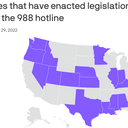Ready or not, 988 mental health hotline prepares for launch

A new three-digit national suicide prevention and mental health hotline — 988 — debuts Saturday, but it's not clear whether the service will be ready for prime time in many parts of the country.
Why it matters: America is struggling with a mental health crisis and it'll be easier to call or text for help with a 911-style hotline.
- But that's only if someone is on the other end of the line who is equipped to respond appropriately, advocates say.
The big picture: In July 2020, the Federal Communications Commission designated 988 as the new emergency service to connect with either the National Suicide Prevention Hotline or Veterans Crisis Line by July 2022.
- More than $430 million in federal funds were allocated to states to scale up and staff crisis centers. But federal officials have still expressed doubts about states' readiness, Politico reports.
- "There is still much work to do," HHS Secretary Xavier Becerra said in a statement Friday. "But what matters is that we’re launching. 988 will be live."
- Fewer than half of the public health officials responsible for deploying 988 say they are confident their communities have the necessary staff, financing or equipment to field the anticipated surge of calls, according to a recent Rand report.
What they're saying: "The concept of 988 is fantastic," Courtney Lang, a health justice advocate and Mental Health America board member, told Axios.
- Yes, but: "This is supposed to be a crisis line," Lang said. "If the communities aren't ready, you're going to have people sitting on hold lines when every second is critical to saving someone's life."
By the numbers: An estimated 11.4 million adults have serious suicidal thoughts, according to a 2022 State of Mental Health Report from Mental Health America. That's up 664,000 from last year’s data.
- Nearly 5% of adults report having serious thoughts of suicide, a figure that has increased every year since 2011, they said.
- It's expected the overall number of calls to the hotline will balloon from 2.3 million a year to more than 13 million within five years.
State of play: Only 21 states have enacted legislation to ensure local call centers will be fully funded. Local officials in several states aren't fully confident about the transition.
- States like Pennsylvania have struggled with adequate staffing. Some call centers are having difficulty hiring and will have to route calls to three regional crisis centers if they're unable to pick up within 60 seconds, Axios' Philadelphia writes.
- Meanwhile, officials in Arizona said they already have a comprehensive state-level system in place and have been able to guide the 988 transition, Axios' Phoenix writes.
Zoom in: Among the lingering concerns is how well the system can live up to promises to divert mental health calls away from 911 which are more likely to result in police intervention than clinical care.
- This is an major equity issue, Lang said. "The 911 system, while providing a life-saving function, did not always preserve life, particularly when it came to Black and Brown communities," Lang said.
- It's also important states and local communities to ensure there are culturally competent operators answering calls, and it's not clear what's been done to address that, she said.
- "A lot of times, Black and Brown communities sort of describe it as pain. They may say 'I'm hurting.' But may not associate that physical manifestation is really due to a mental health phenomenon. 'What do you mean you're hurting?'"
The bottom line: There's been a lot of expectation management by officials in recent days even as officials try to promote the new service.
- "Things like 911 have had decades of funding and have been able to build up an infrastructure behind it," Matt Miclette, vice president of clinical operations for mental health tech company Neuroflow, told Axios. "988 isn’t going to be able to do overnight."
If you or someone you know may be considering suicide, contact the National Suicide Prevention Lifeline at 1-800-273-8255 (En Español: 1-888-628-9454; Deaf and Hard of Hearing: dial 711 then 1-800-273-8255) or the Crisis Text Line by texting HOME to 741741.